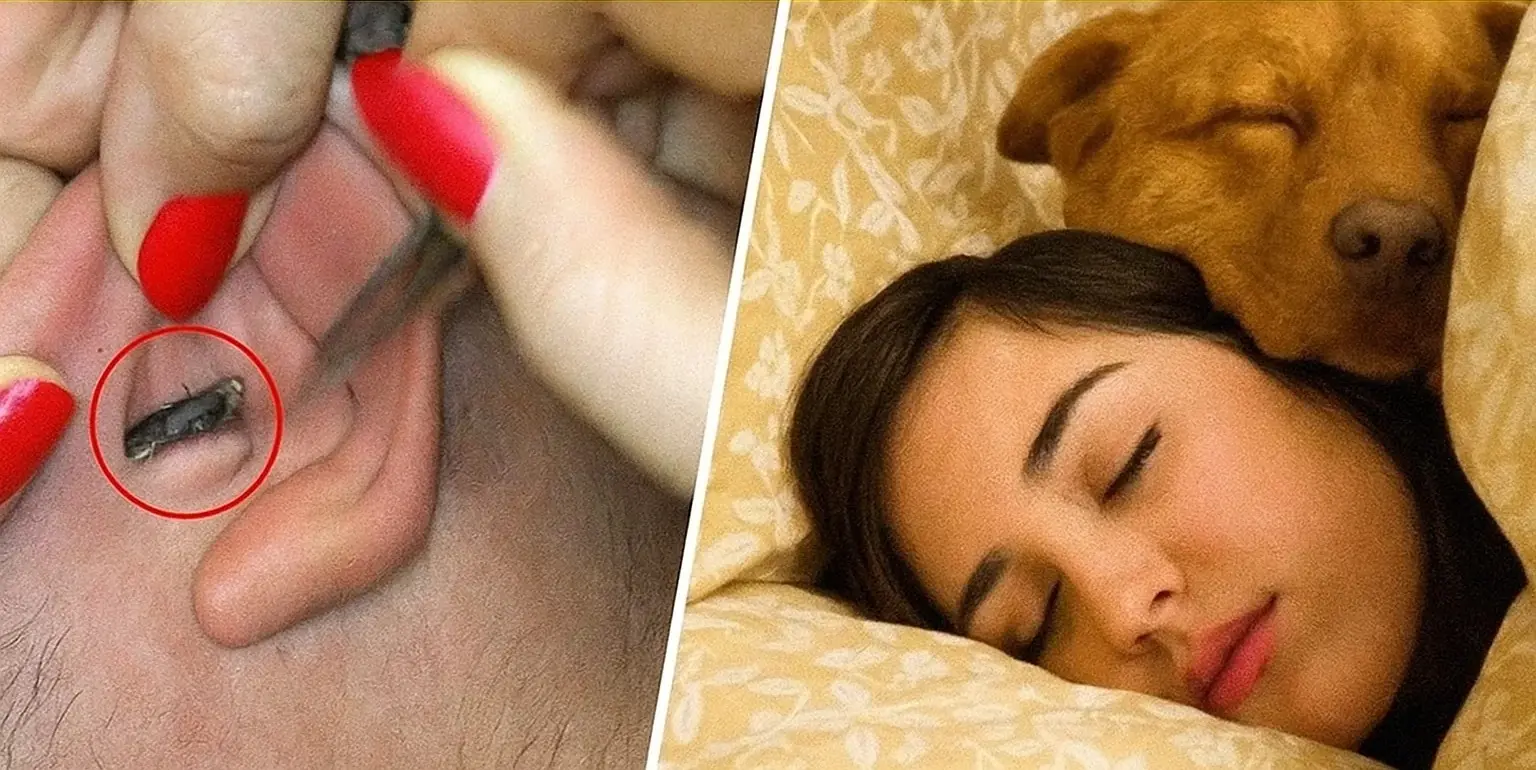
Don’t Sleep With Your Pets: Doctors Reveal The Reason Why

It may feel comforting to snuggle up with your cat or dog at night, but health experts warn that letting pets share your bed could be riskier than you think. While the emotional bond is undeniable, science shows there are hidden health concerns that every pet owner should consider before turning their bed into a shared sleeping space.
The Debate: Comfort vs. Health Risks
Many people treat their pets like family members, even allowing them to kiss their faces or curl up under the blankets. This close bond can provide warmth, stress relief, and emotional comfort. However, researchers caution that such intimacy isn’t always beneficial. Pets, though adorable, can carry bacteria, parasites, and allergens that may pose risks to human health.
In fact, experts have identified over 250 zoonotic diseases—illnesses that can spread from animals to humans—and more than 100 of these infections come directly from domestic pets. This doesn’t mean you should avoid your furry friend, but it does highlight the importance of boundaries and proper hygiene.

Potential Risks of Sleeping With Pets
🧼 Hygiene Concerns
Pets love to explore the outdoors. They may roll in grass, soil, or even more unpleasant things such as animal waste or deceased wildlife. Without you noticing, they can track in fleas, ticks, fungi, or harmful bacteria and transfer them to your sheets, pillows, and skin. Over time, this exposure increases the risk of infections or skin irritation, especially if you have a weaker immune system.
😴 Disrupted Sleep
While you might fall asleep faster with your pet by your side, your overall sleep quality may suffer. Cats tend to be nocturnal, often jumping off and on the bed, while dogs may bark, scratch, or shift positions throughout the night. These small interruptions can lead to fragmented rest, reduced deep sleep, and feelings of fatigue the next day.
🐾 Difficult Habits to Break
Once a pet becomes accustomed to sharing your bed, it can be very challenging to change the routine. If you decide later that you want better rest, pets may whine, scratch, or bark at the door when denied entry. This emotional struggle often leaves owners torn between their health and their pet’s happiness.
Health Concerns Linked to Co-Sleeping With Pets
- Allergies – Pet hair and dander can trigger sneezing, watery eyes, or even asthma attacks in sensitive individuals. Long-term exposure in the bedroom often makes these symptoms worse.
- Hookworm and Other Parasites – Dogs and cats may carry intestinal parasites such as hookworms, which can infect humans through close contact, leading to digestive discomfort or itchy skin rashes.
- Respiratory Infections – Pets can bring in fungi, dust, or bacteria that may contribute to respiratory illnesses. In children or people with weakened lungs, this can escalate into bronchitis or asthma flare-ups.
- Intestinal Parasites – Cats and dogs can carry microscopic organisms in their stool, which may be transmitted accidentally if proper hygiene isn’t maintained. Children, who are more likely to touch pets and then their faces, are at higher risk.
Balancing Love and Safety
The idea isn’t to push your pet away, but rather to find a healthier balance. Here are some ways to protect both yourself and your furry friend:
- Keep up with vet checkups to monitor for parasites and illnesses.
- Practice regular grooming—bathing, brushing, and trimming nails reduce contamination risks.
- Use separate pet beds near your own bed to maintain closeness without sharing the same sheets.
- Wash bedding frequently to minimize allergens and germs.
- Train pets early to respect bedtime boundaries so habits don’t become impossible to change.
The Bottom Line
Cuddling with your pet is heartwarming, but science shows it comes with real health considerations. From sleep disruption to parasites and allergies, the risks are not to be ignored. By setting boundaries and prioritizing hygiene, you can enjoy the best of both worlds—a strong emotional connection with your beloved companion while still protecting your health and getting the rest your body needs.
News in the same category


9 Medications That Can Negatively Interact With Green Tea

More people are dying from heart failure, doctors warn: give up these 4 habits now

How to Get Rid of Lizards: Effective Natural Ways that Really Work

How to Keep Snakes Away: Effective Snake Repellents

Healthy Man Shares the Unexpected Bathroom Symptom That Exposed His Bowel Cancer
When 38-year-old Dave Paxton noticed his stool had turned darker than usual, he had no idea this small sign would lead to a devastating cancer diagnosis—one so rare that only 22 people in the world have ever had it.

Eat Sweet Potatoes Daily and See These 7 Sh0cking Changes On Your Body
Sweet potatoes contain resistant starch, a special carbohydrate that bypasses digestion in the small intestine. Instead, it ferments in the large intestine, promoting the release of hormones that signal satiety to the brain. T

Surprising Health Benefits of Chicken Feet That Will Change the Way You Eat
Chicken feet may not look glamorous, but their nutritional profile proves they deserve a place at your table.

10 Early Signs of Pancreatic Cancer

5-Year-Old Loses Battle With Cancer — Doctors Reveal 5 Foods Parents Must Never Give Their Children

If Your Legs Cramp at Night You Need to Know This Immediately

All The Things You Need to Know About Nighttime Urination And When To Start Worrying

Doctor Says You Should Stop Peeling Off Those Banana Strings

Morning Drinks That Supercharge Your Kidneys: 5 Natural Remedies Backed by Science
Your kidneys quietly work around the clock to filter waste, balance fluids, and regulate blood pressure—yet most people neglect them until problems arise. Starting your morning with simple, kidney-friendly drinks can protect these vital organs and set t

7 Alarming Signs of Nasopharyngeal Cancer You Should Never Ignore
Nasopharyngeal cancer often hides behind symptoms that look like common colds or allergies. Recognizing these early warning signs can make all the difference in timely treatment and recovery.

The Science-Backed Benefits of Elderberry (Plus an Easy Syrup Recipe)

Why Almonds Are So Good for You: Health Benefits Backed by Science

Use This Simple Method to Kill the Bacteria Causing Heartburn and Bloating Before It’s Too Late
News Post

10 Ordinary Fruits With Amazing Health Benefits

9 Medications That Can Negatively Interact With Green Tea

More people are dying from heart failure, doctors warn: give up these 4 habits now

How to Get Rid of Lizards: Effective Natural Ways that Really Work

How to Keep Snakes Away: Effective Snake Repellents

This School Is Teaching Teen Girls Important Life Skills Like Changing Tires and Other Car Maintenance

Indiana Woman Arrested After Traveling To DC To Kidnap And Assassinate Trump

Healthy Man Shares the Unexpected Bathroom Symptom That Exposed His Bowel Cancer
When 38-year-old Dave Paxton noticed his stool had turned darker than usual, he had no idea this small sign would lead to a devastating cancer diagnosis—one so rare that only 22 people in the world have ever had it.

Eat Sweet Potatoes Daily and See These 7 Sh0cking Changes On Your Body
Sweet potatoes contain resistant starch, a special carbohydrate that bypasses digestion in the small intestine. Instead, it ferments in the large intestine, promoting the release of hormones that signal satiety to the brain. T

Why Slugs Deserve More Credit Than You Think

Sink Trick You Should Always Do Before Vacation

The Meaning of Having an Unmade Bed

How to Charge Your Phone to Extend Battery Life

Surprising Health Benefits of Chicken Feet That Will Change the Way You Eat
Chicken feet may not look glamorous, but their nutritional profile proves they deserve a place at your table.

82-Year-Old Woman Reverses Dementia Symptoms with Mediterranean Diet

10 Early Signs of Pancreatic Cancer

5-Year-Old Loses Battle With Cancer — Doctors Reveal 5 Foods Parents Must Never Give Their Children

Surgeons Have Achieved The First-Ever Robotic Heart Transplant Without Any Chest Cuts

People Are Just Realizing Why Women’s Underwear Have A Bow On Front
